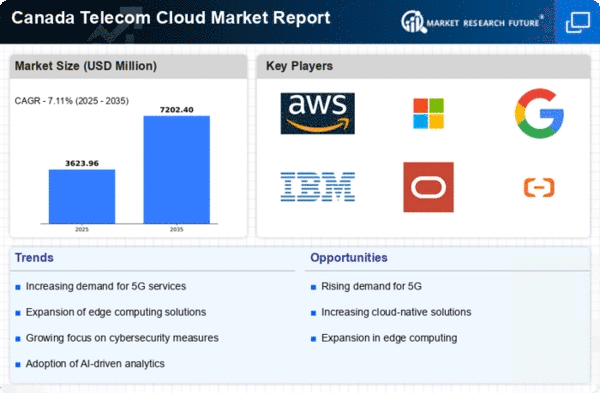Emergence of 5G Technology
The rollout of 5G technology is poised to significantly impact the telecom cloud market in Canada. With its promise of ultra-fast connectivity and low latency, 5G is expected to drive demand for cloud services that can support advanced applications such as IoT and smart cities. As telecom operators invest heavily in 5G infrastructure, the integration of cloud solutions becomes increasingly essential to manage the vast amounts of data generated by connected devices. Current projections indicate that the adoption of 5G could lead to a 30% increase in cloud service utilization among telecom companies in Canada. This emerging technology not only enhances the capabilities of the telecom cloud market but also opens new avenues for innovation and service delivery, positioning Canada as a leader in the digital landscape.
Shift Towards Cost Efficiency
Cost efficiency emerges as a pivotal driver in the telecom cloud market in Canada. Organizations are increasingly recognizing the financial advantages of migrating to cloud-based solutions, which often result in reduced operational costs. A recent survey indicates that nearly 65% of Canadian enterprises report significant savings after transitioning to cloud services. This shift is particularly relevant in the telecom sector, where traditional infrastructure maintenance can be prohibitively expensive. By leveraging cloud technologies, telecom companies can optimize their resources and redirect funds towards innovation and customer service enhancements. The focus on cost efficiency not only supports the growth of the telecom cloud market but also encourages businesses to explore new service offerings, thereby fostering a competitive landscape.
Growing Demand for Scalability
the telecom cloud market in Canada is experiencing a notable surge in demand for scalable solutions. As businesses increasingly seek to adapt to fluctuating workloads, the ability to scale resources up or down becomes essential. This trend is particularly pronounced among small to medium-sized enterprises (SMEs) that require flexible infrastructure without the burden of significant capital expenditure. According to recent data, approximately 60% of Canadian businesses express a preference for cloud solutions that offer scalability. This growing demand is likely to drive innovation within the telecom cloud market, as providers strive to meet the diverse needs of their clients. Furthermore, the emphasis on scalability aligns with the broader digital transformation initiatives across various sectors, indicating a robust future for the telecom cloud market in Canada.
Rising Importance of Data Analytics
Data analytics is becoming increasingly vital within the telecom cloud market in Canada. As organizations generate vast amounts of data, the ability to analyze and derive insights from this information is crucial for informed decision-making. Telecom companies are leveraging cloud-based analytics tools to enhance their operational efficiency and customer engagement strategies. Recent findings suggest that approximately 55% of telecom operators in Canada are investing in advanced analytics capabilities to better understand customer behavior and preferences. This trend indicates a shift towards data-driven strategies, which are likely to shape the future of the telecom cloud market. By harnessing the power of data analytics, telecom providers can offer more personalized services, ultimately leading to improved customer satisfaction and loyalty.
Regulatory Support for Cloud Adoption
the telecom cloud market in Canada benefits from a regulatory environment that encourages cloud adoption. Government initiatives aimed at promoting digital infrastructure and innovation play a crucial role in this context. For instance, the Canadian government's commitment to enhancing broadband access and digital services has led to increased investments in cloud technologies. Recent reports indicate that over 70% of telecom operators in Canada are actively pursuing cloud-based solutions, driven by regulatory incentives. This supportive framework not only facilitates the growth of the telecom cloud market but also fosters competition among service providers, ultimately benefiting consumers through improved services and pricing. As regulations continue to evolve, the telecom cloud market is poised for further expansion in Canada.
















